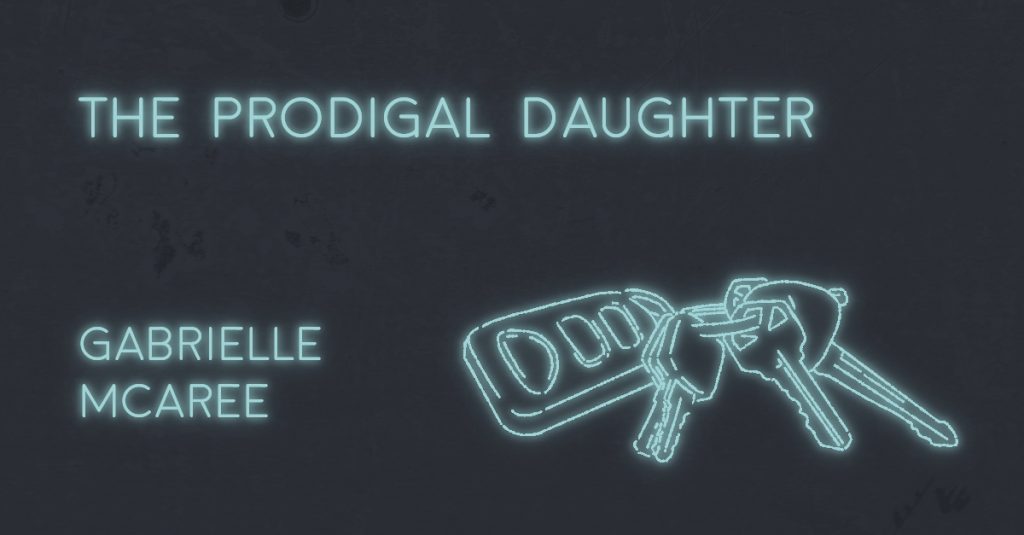Dad has the emotional range of a runt-sized peanut. He hates the internet, roundabouts, tap water, trash collection, anyone called “Jerry.” He doesn’t trust directions and believes the government is listening in on his conversations. Dad grows a four-inch beard as an act of defiance, because it looks nothing like his driver’s license picture, and swears off technology. His collection of gray hair disappoints him, so he buys an electric blue Camaro.
***
When Dad turns 63, I pick up a cake from the store. Half chocolate, half vanilla to curb his untreated bipolar disorder. I remember to be vigilant, but Dad counts each wax candle with the tenacity of a bored mathematician.
“You’re not good with numbers, Darby,” he says.
He’s joking, but my face turns the color of ripe tomatoes. When I forget a candle, everyone laughs at my dereliction, my stupidity. “I studied theatre,” I object, my voice two sizes too small. But my claim is futile; my siblings have PhDs attached to their names. I don’t.
***
I screw my eyes shut as Dad slams cabinets and drawers, looking for his checkbook, his car keys, his wallet, his readers. We search behind potted plants, between freezer meat, amidst his collection of coffee mugs, below the kitchen sink. His things are nowhere and everywhere, scattered around the house like an expert game of Where’s Waldo.
“I’d lose my head if it wasn’t attached,” he says. His self-hate is camouflaged by Dad Humor, the color of sunshine and imported silk. It is impossible not to love him.
Dad finds his checkbook in his coat pocket. His keys in the cupholder. His wallet in the washer. His readers in the pantry next to the peanut shells. Everyone laughs the same choked, plaintive laugh, but we actively fail Dad as he sinks into an amnesiac-sponsored abyss.
Dad is a renowned surgeon. He’s been saving lives for thirty-plus years—one appendectomy at a time—but he forgets his cellphone on the charger and can’t remember to take the dogs out. Their hoarse barks cut through glass. Why can’t I remember? Dad asks, gluing his leathery hands to his eye sockets, rubbing his skin an unforgiving red. He gives the dogs extra treats to counterpose his laxness. All is forgiven.
I bury myself in books I don’t understand.
“Why can’t Dad remember?” I ask a cashier clerk, the expired tub of animal crackers, oblivion. Surely, there is an answer.
“There’s an answer for everything,” Dad says. “It’s good you’re pretty, Darby.”
I read and read and read.
***
I go local for college and save Dad money by commuting. On Sundays, we sit in matching gray, leather chairs by the fireplace. Dad tells me about his sister, Jenny, who joined the Peace Corps and changed her name to Loki; his favorite dog, Hamish; how he regrets: not joining the Army; not competing in triathlons; not taking Sami Gates to his senior prom.
“Getting old sucks,” he says. “Your regrets look like a grocery list. Cheat age if you can, Darby.” But he doesn’t tell me how.
Dad takes a party platter of vitamins—collagen, crocin, retinol, magnesium—and drinks a glass of red wine before bed, toasting to the vestige of his youth.
I look at myself in the mirror for traces of him and keep the water running so he can’t hear me cry. I am older every day and can’t afford to feel better about my relation to mortality. I don’t have money for distractions.
***
My sister sends her wedding invitation in the mail. She’s marrying a guy from medical school, Mark Something. Mark Something believes Dad has early-onset Alzheimer’s. I’m not asked to be in the wedding party, but my other sister, the dentist, is maid of honor. My brothers, groomsmen. Dad asks why I don’t have a career. He says, “Maybe if you had a career, you’d be in your sister’s wedding.”
Dad pays the wedding tab with his American Express Black Card, but forgets his suit at home, so I drive back in rush-hour traffic to retrieve it. He can’t walk down the aisle in his Notre Dame jersey and orange board shorts.
Dad’s collection of ex-wives sit in the last pew, in chronological order. Throughout the service, he turns around to look at them, the physical representations of his life, decade after decade, each a nod to his impermanence. Gloria, Dakota, Macie, Rebecca, Lorraine. They agree Dad is a good man, he just couldn’t remember things they wanted him to remember. They all signed prenups, so Dad keeps his cabin in the woods, his 13 acres, his Camaro.
***
When I’m nine, I learn that everything dies. Humans, insects, rats, nature, inanimate objects. At first, I don’t accept this. I cry into Dad’s lap, staining his favorite corduroys. He strokes my hair while lecturing me on biology, science, The Lion King. We’re at my sister’s softball practice. Dad lets me sob, hysterically, without shushing me.
He says, “Forever is boring, Darby. Imagine paying taxes forever.”
***
At 66, Dad is diagnosed with Alzheimer’s. Mark gloats. My siblings strategize at the kitchen table without me. Dad gets a catheter two months later. He wants to drink Irish whiskey and sleep. I listen to his stories. I am all his children, his wives, his friends. I cover him in thick blankets and empty his urine. When Dad dies, he leaves me the electric blue Camaro, the log cabin, everything. My siblings hire an attorney. A letter arrives, postmarked before Dad’s death. It reads: Darby, you were always my favorite.
The next morning, I lose my keys.

